Early Signs: New Zealand’s Climate Refugees
Air Date: Week of March 31, 2006
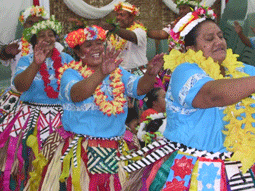
Tuvaluans perform traditional song and dance - called fatele - in a West Auckland meeting hall. (Photo: Durrell Dawson)
In the latest in a series of reports from places where concerns about climate change are already having an impact, reporter Ali Berzon traveled to New Zealand. Residents of the Pacific Island nation of Tuvalu have been moving there, and some consider themselves the world's first climate refugees.
Transcript
CURWOOD: It’s Living on Earth. I’m Steve Curwood. Today we continue our special series "Early Signs: Reports from a Warming Planet." The series is a collaboration of the UC-Berkeley Graduate School of Journalism, Salon dot com, and Living on Earth to document places around the world where concerns about climate change are already having an impact.
Today we turn to the people of the tiny Pacific Island nation of Tuvalu, who have been vocal for years about the threat of climate change to their low-lying nation. At about three feet above sea level, the islands are expected to eventually disappear, drowned by a sea rising in response to global warming.
Seeing themselves as climate refuges some Tuvalans are already leaving their islands, moving their communities to higher ground in a new land. Alexandra Berzon reports from New Zealand.
[TUVALU MUSIC FROM PARTY; SINGING AND DRUMMING]
BERZON: It’s the biggest party of the year for one of the nine islands that make up Tuvalu, Nanumea, the annual celebration of the day European missionaries brought Christianity to the island. Families gather on mats and feast picnic-style on foods like funafuna, donuts filled with jam, taro drenched in coconut milk, egg fu young, and buckets of KFC chicken. Then competing groups of elders and youth take turns dancing, singing and drumming on a big wooden box into the early hours of the morning, while onlookers stand up and announce jokingly which group they liked best.

Tuvaluans perform traditional song and dance - called fatele - in a West Auckland meeting hall. (Photo: Durrell Dawson
BERZON: Tuvaluans have been performing these songs for generations, across their string of low coral atolls. But this event is not taking place in Tuvalu. Instead, we’re 2,000 miles away in Auckland, New Zealand. And here, surrounded by tradition, sits a group of young girls looking unimpressed.
AMY: What’s your name?
BERZON: Ali. What’s your name?
AMY: Amy!
BERZON: Nice to meet you, Amy.
AMY: Nice to meet you, Ali.
BERZON: Amy is seven and her favorite song is “My Humps” by the Black Eyed Peas.
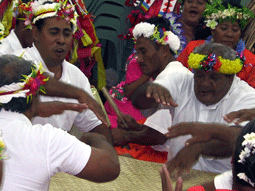
Drummers pound on a straw mat laid over a wooden box as Tuvaluans in Auckland perform traditional dances. (Photo: Durrell Dawson)
BERZON: Here in this West Auckland suburb where many Tuvaluans have settled, you won’t find an ocean outside the door, coconut trees on the shore or taro in every garden. You’re more likely to encounter malls and wide boulevards. Over the last decade, the islanders have come here for many reasons – better jobs, college, overcrowding on the islands – and to escape what many see as a threat of sea level rise, caused by global warming.
[BREAKFAST SOUNDS]
P. TANIELA: That’s me. Prepare the breakfast every morning for my family.
BERZON: Penisita Taniela arrived in New Zealand with a small suitcase and a carton of fish.
He lives now in the western working-class suburb Ranui in a three-bedroom home with his wife, children, father, stepmother, and sisters.
[SOUND OF KIDS]
BERZON: Peni’s living room, like most Tuvaluan homes, contains no furniture – just hand-woven straw mats that his father and step-mom sleep on. Shell necklaces and family photos line the walls. As Peni fries pancakes on a leisurely Saturday morning, his two young kids ride around the living room on a shiny new bike with a squawk box.
[SOUND OF LOUD BELL]
BERZON: Nearly twenty years ago, when Peni was just a teenager living on his family’s land, he remembers hearing that some day the sea would rise and drown his island.
P. TANIELA: Just my dad said, ‘Oh, don’t worry about that. We are just waiting for many years.’ Not, not now.
BERZON: But over time, Peni and his family noticed changes – high tides getting higher, beaches eroding, water coming up through the soil. Here’s his father, Telaki Taniela.
T. TANIELA: As a kid we used to play on the beach. We see the high tide and all that but in recent years high tide gone over beyond what it used to be. I said to myself, yes, the scientists really are telling the truth. I managed to build two houses there. I just got up and go and left it behind to my family there.
BERZON: Gauges in Tuvalu indicate the sea has risen an average of five and a half millimeters per year in recent years. That’s consistent with average worldwide sea level rise. But scientists say there are also other local explanations, natural and human-caused, for the changes islanders have observed.
The greater worry is for the future. The Intergovernmental Panel on Climate Change, which represents the consensus of 2,000 scientists, predicts that over the next 50 to 100 years global warming will cause oceans to rise up to three feet, and possibly much higher, depending on the melting of the Antarctic and Greenland ice sheets. Tuvalu, along with a handful of other islands, is particularly vulnerable because its islands are low-lying and narrow – no more than three feet high in many spots.
Some New Zealand scientists argue that because islands are not static lumps of dirt, they will shift with the tides and naturally build themselves up further to withstand a rising ocean. But even those who believe this – and their view meets skepticism from other scientists – even they say the islands will probably become uninhabitable. For many Tuvaluans, this is not a risk they’re willing to take.
T. TANIELA: I don’t want to get up in the morning and find myself under water.
[SOUND OF VIDEO FROM TUVALU]
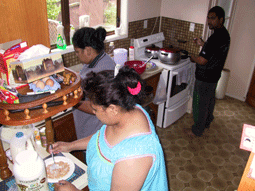
Penisita Taniela cooks breakfast with his step-mother and wife on a leisurely Saturday morning. (Photo: Durrell Dawson)
P. TANIELA: I show my kid that movie from Tuvalu and say, ‘Ohhhh, Tuvalu, Tuvalu, where is Tuvalu?’ They don’t know where is Tuvalu. And say, maybe they will go there one time. Maybe one day we go there and see the island.
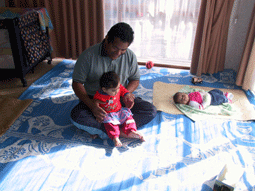
Telaki Taniela plays with his grandaughter in his living room, while his youngest child looks on. (Photo: Durrell Dawson)
T. TANIELA: When I was young I was told that there are two main things you have to learn if you want to live in Tuvalu: how to climb the coconut tree and how to fish. If you know these two then you will live. But in New Zealand, no, you have to have an income. It’s a very challenging place. Everything you do, it costs you money.
BERZON: Though in a way he was driven out, most of the time Mr. Taniela looks forward instead of back. He’s pleased to have started a business last year that finds temporary migrant labor for New Zealand companies. His son, Peni, like many Tuvaluans, started out in Auckland’s strawberry fields and packing plants.
[SOUND OF PACKING PLANT. WOMEN SINGING]
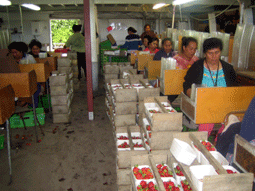
This strawberry packing plant in West Auckland has become a community hub for Tuvaluan women. (Photo: Alexandra Berzon)
WOMAN: I meet my friends here, and all the Tuvaluan ladies here.
BERZON: Here, women sit behind tiny desks rapidly sorting through strawberries, putting the good ones in plastic containers and throwing the bad down a shoot into a pile that will become jam.
[SOUND OF KATALINA KOFE TALKING IN TUVALUAN]
BERZON: Katalina Kofe is wearing a red sarong over black sweat pants, with a pink flower in her hair. She’s been working in the fields in the morning, and packing berries in the afternoon.
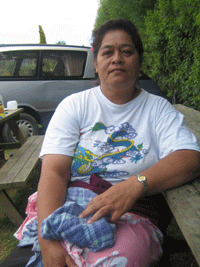
Katalina Kofe on her lunch break at the strawberry packing plant. She misses Tuvalu, but says she had to move to New Zealand for her family's safety. (Photo: Alexandra Berzon)
[SOUND OF RECITATION IN CHURCH]
BERZON: On Sundays, the Congregation Christian Church of Tuvalu gathers to recite verse and sing hymns beneath framed photos of middle-aged white men in this rented Lion’s Club Hall.
[HYMN]
BERZON: In1998, Reverend Suamalie Iosefa came to New Zealand to set up the Auckland branch of the church. He is 48 but has the aura of a much older man, an elder. He spreads himself thin attending meeting after meeting to try to better the community, and feels some responsibility for preserving Tuvaluan culture here.
IOSEFA: Teaching the children in Sunday school in the language, our services in the language. But the younger children they speak fluent English, not like us.
[SOUND OF PEOPLE SHUFFLING OUT. SOUND OF VACUUM CLEANER]
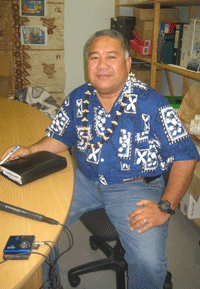
Reverend Suamalie Iosefa in his Pasifika Healthcare offices. (Photo: Alexandra Berzon)
TAMAIO: I just want to migrate to migrate, no threatening reasons.
BERZON: Like some other religious Tuvaluans, Vaililo doesn’t believe in global warming because he doesn’t think God would ever let anything bad happen to Tuvalu.
TAMAIO: I don’t believe Tuvalu will submerge, no. We do adhere to the religious belief that God will help the people in his country, Tuvalu.
BERZON: But Tuvaluans are of many views. Reverend Suamalie says God and science are speaking with one voice, issuing a warning that humans must follow.
IOSEFA: Noah listened because God said build the ark. But do we listen? And I think the church has to have more understanding of science and what the world is all about.
BERZON: He gives the example of a Tuvaluan who has come to New Zealand without learning the rules of the road, and then blames God when he gets hit by a car crossing the street.
IOSEFA: And then people say, ‘God has taken him.’ No, he is not a silly God. But it’s you who is silly, you don’t know the rules and you were hit by the car in the road.
[RADIO SHOW PROMO]
BERZON: Fala Haulangi’s weekly radio show has become a venue for these differing views, a place to discuss the hot button issues and the lighter fare.
[FALA TALKING ON AIR]
BERZON: She is a union organizer by day, with a wild tuft of highlighted hair and over-the-top hand gestures. We talked at a Starbucks in a West Auckland mall.
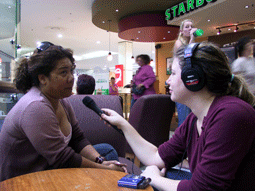
Alexandra Berzon interviews Tuvaluan radio show host Fala Haulangi at a Starbucks in an Auckland mall. (Photo: Durrell Dawson)
BERZON: Fala and Suamalie, along with international environmental activists, argue that Tuvaluans and others in a similar predicament should be treated like refugees and given immigration rights and other refugee benefits. This tiny nation was among the first on the globe to sound the alarm, trekking from forum to forum to try to get the world to listen. New Zealand did agree to take 75 Tuvaluans a year as part of its Pacific Access Category, an agreement made in 2001. Koloa Talake knows all about this. He was Prime Minister of Tuvalu at the time.
TALAKE: You can see the sea from here…
BERZON: Mr. Talake now lives across from the beach on a remote peninsula north of Auckland. He says that decision to make it easier for his own citizens to move away from his country was difficult, but necessary.
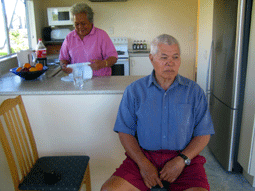
Former Tuvalu Prime Minister Koloa Talake stares at at the beach across the street from his home on a remote peninsula north of Auckland. (Photo: Alexandra Berzon)
BERZON: And now that Tuvaluans are living in New Zealand, they’re beginning to have a voice here, too.
CARTER: My name’s Chris Carter. I’m a member of parliament. I represent perhaps the largest number of Tuvalu people in the parliament because the majority of community live here in western Auckland. The government recognizes very much that Tuvalu particularly, being an atoll state, is very vulnerable to climate change and to rising sea levels. In fact, our prime minister has told the prime minister of Tuvalu that if the worst comes to the worst we will take the entire community. All I can say is that there's an understanding between our two governments that New Zealand will respond to the needs of Tuvalu if the circumstances become critical. And how could we not?
BERZON: That agreement to take the entire population if there’s an environmental crisis is unofficial and unenforceable. And to some politicians, including Minister of Parliament Pita Paraone of the New Zealand First Party, it is the wrong policy for New Zealand.
PARAONE: That responsibility shouldn’t just fall on New Zealand. Tuvaluans need to be aware that there are other nations in the Pacific Basin that could just as well accommodate them, probably even better than we can.
BERZON: And now, the current Tuvaluan government says this disagreement doesn’t matter because finding a place for refugees doesn’t address the underlying problem.
SOPOAGA: I think these things are quick-fix approaches.
BERZON: That’s Enele Sopoaga, Tuvalu’s ambassador to the United Nations.
SOPOAGA: We are just running away from the problem. Tuvaluans want to live in their own islands forever. This is a global problem. All the low-lying coastal areas are going to be affected. Now you tell me whether the world is ready to evacuate everybody and relocate them. There is a challenge to reverse and address climate change, and I think the world should focus on that.
[SOUND OF WAVES]
BERZON: The day after the feast celebrating the coming of the missionaries, Nanumeans gather bleary-eyed at a beach party up the coast. Teenagers and twenty-somethings in last night’s sarongs play traditional games, including more nuanced forms of Duck Duck Goose and volleyball. The older people lie out on mats and eat last night’s food.
[SONG]
BERZON: One family sings a Tuvaluan song about the islands’ only ship, a gift from the Japanese government. Seven-year-old Amy runs from the waves.
AMY: I just ask my auntie and she say yes, so I just went. I’m cold. (chattering)
BERZON: This party might be a close approximation of daily life in Tuvalu, but here in Auckland, it’s just a holiday. Silou Temoana is washing the sand out of her thick hair. She believes reports that the sea could overtake the islands but she just can’t imagine a world without Tuvalu in it.
TEMOANA: That’s unthinkable. I never thought of that, because in my mind it’s going to be there forever.
[SONG]
BERZON: For Living on Earth, this is Alexandra Berzon.
 |
 |  |  |
Links
To see a print version of this story, and other reports in this series, click here
Living on Earth wants to hear from you!
Living on Earth
62 Calef Highway, Suite 212
Lee, NH 03861
Telephone: 617-287-4121
E-mail: comments@loe.org
Newsletter [Click here]
Donate to Living on Earth!
Living on Earth is an independent media program and relies entirely on contributions from listeners and institutions supporting public service. Please donate now to preserve an independent environmental voice.
NewsletterLiving on Earth offers a weekly delivery of the show's rundown to your mailbox. Sign up for our newsletter today!
 Sailors For The Sea: Be the change you want to sea.
Sailors For The Sea: Be the change you want to sea.
 The Grantham Foundation for the Protection of the Environment: Committed to protecting and improving the health of the global environment.
The Grantham Foundation for the Protection of the Environment: Committed to protecting and improving the health of the global environment.
 Contribute to Living on Earth and receive, as our gift to you, an archival print of one of Mark Seth Lender's extraordinary wildlife photographs. Follow the link to see Mark's current collection of photographs.
Contribute to Living on Earth and receive, as our gift to you, an archival print of one of Mark Seth Lender's extraordinary wildlife photographs. Follow the link to see Mark's current collection of photographs.
 Buy a signed copy of Mark Seth Lender's book Smeagull the Seagull & support Living on Earth
Buy a signed copy of Mark Seth Lender's book Smeagull the Seagull & support Living on Earth

